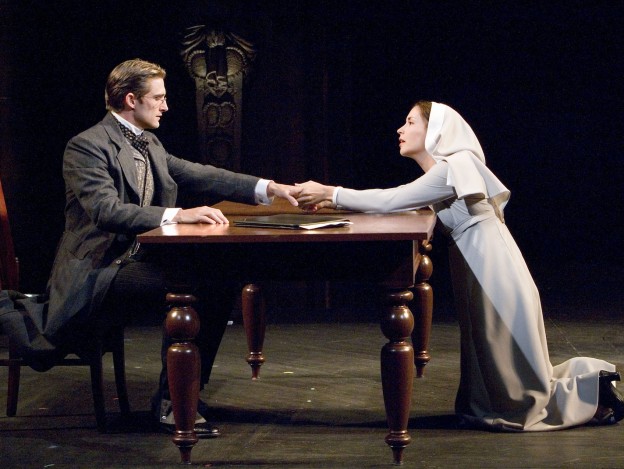Critics have 99 problems and disagreeing on Measure for Measure is definitely one of them. Continue reading



Critics have 99 problems and disagreeing on Measure for Measure is definitely one of them. Continue reading

Among the elements of comedy that ultimately are placed under uncomfortable strain in the eyes of the audience, the bed trick in Shakespeare’s Measure for Measure is an particularly palpable one. Although an element of romantic comedy, the bed trick has long represented a problem of both morality and realism in its usage.
There are two posters that I’ve carried with me throughout my Dartmouth Career. I’ve schlepped them from room to room, rolled them up every ten weeks and then unrolled them, flattened them out, and pinned them up. One is my dad’s poster of John Belushi as Senator Blutarsky, and the other is the final stage direction from Ibsen’s A Doll’s House.
A Doll’s House famously ends with Nora, the protagonist of the play, leaving her husband and children with the door slamming behind her. I adore A Doll’s House, and find the ending deliciously satisfying in a way that I could never find the ending to Measure for Measure.
Louise Schleiner, in her essay “Providential Improvisation in Measure for Measure”, takes a closer look at the play’s Duke Vincentio. In doing so, Schleiner examines biblical parallels and allusions within the play and their implications on the characterization of the duke, as well as the insinuations about Shakespeare’s society that stem from the duke’s character. Continue reading
Darryl Gless begins Measure for Measure, the Law and the Convent essentially by refuting every criticism written about Shakespeare’s Measure for Measure. Though it is certainly a statement that gets people’s attention, anyone that reads Gless’ book will learn that there is a self-congratulatory, arrogant air to his writing. Continue reading

Isabella’s response to Angelo’s sexual proposition in Act 2 Scene 4 of Measure for Measure displays Shakespeare’s true genius and lexical prowess. After reading this passage numerous times, I found myself rethinking the sexual state of women who “endure the livery of a nun” in “austerity and single life” (I.1.70/90), as Theseus described in A Midsummer Night’s Dream. Critics claim that Isabella’s refusal of Angelo’s advances is a testament to her “pathological sexual repression.” One Shakespearian surmises, “beneath the habit of the nun there is a narrow-minded but passionate girl afflicted with an irrational terror of sex which she has never admitted to herself” (Barton, 580). However, I believe Isabella’s sexual desire is not repressed, but satisfied through alternative means with an unseen partner, the man she has devoted her body and soul to: Jesus Christ. Continue reading
Shakespeare’s Measure for Measure has been popularly referred to as a “problematic play” because of its seemingly convoluted plot. The play has earned this title because the Claudio’s punishment does not fit his supposed crime, because Angelo’s offer to spare Claudio comes at a perverse and indecent trade, and because the way in which Claudio is finally saved is a kind of underhanded operation conceived by the Duke. In each of these three major points of the play, there is some subversion of the ethics understood by an audience. The questions are, then: why create this tension? With what ideas of morality or conduct is Shakespeare playing? How does the play resolve, if at all, the conflict between the ideas it thematically explores throughout its course? Continue reading

Why does Isabella fail to persuade Angelo to spare Claudio’s life? Bernice Kliman, in her article, Isabella in Measure for Measure, states that it is because she fails to use the formulaic rhetoric established by ad Herennium, one of Shakespeare’s sources for Measure for Measure. But is Kliman’s characterization of Isabella true to the text or colored by the literary comparisons she chose to make?
In Shakespeare’s Measure for Measure there exists a paradox of the punishment of fornication only being able to be lifted by more fornication. I am referring to the deal that Angelo attempts to make with Isabella, her virginity for her brothers freedom. This issue, however, is reflective of a greater anxiety of the state invading personal spaces. From Claudio’s arrest to the loss of Mistress Overdone’s livelihood to the bargaining of Isabella’s virginity, the destructiveness of the state’s involvement with matters concerning sex as an anxiety of the play is evident. Continue reading

Many critics of Measure for Measure have focused on a sexual Isabella—not necessarily as overtly sexual, but perhaps sexually repressed, confused, naïve or, in some of the worst cases, provocative. I want to introduce the idea of an asexual Isabella.
Asexuality is a lack of sexual attraction to anyone, and while it still remains barely visible in both the straight and queer communities, it is as real and present as any other sexuality. But in a world that sexualises women in every situation, pushes sex on us at every moment, and tells us that romantic relationships are necessary to our happiness and wholeness, asexuals often remain unnoticed or misunderstood. Continue reading